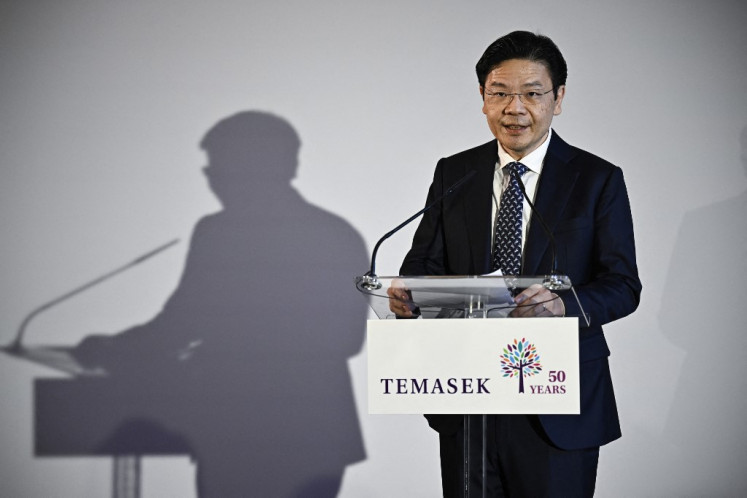Hopes alive for the two-state solution?
Salem Mu’tan, a Palestinian from the village of Burqah in the West Bank, was forced to move to the United States following the 1967 Israeli Occupation
Change Size

S
alem Mu’tan, a Palestinian from the village of Burqah in the West Bank, was forced to move to the United States following the 1967 Israeli Occupation. After retiring, he decided to return home only to realize that the land where he was born was nothing like it used to be with the encroaching Israeli settlements and onerous roadblocks.
Despite all the hurdles, he said “Life in the US is easy, but I come here because I love my land, I miss it”. (btselem.org). For 50 years Salem and the rest of the Palestinians have had to grapple with their ceaseless longing for home, the longing that reverberates throughout the world, including in Indonesia, where there is humongous sympathy for the Palestinians’ agony.
While the Israel-Palestine conflict might seem like rocket science, there has always been an international consensus on what its resolution should generally look like, what is often referred to as the so-called “two-state solution”.
The consensus was again reaffirmed in Paris, where more than 70 countries, including Indonesia, gathered to bolster international support for the two-state solution. The French initiative is undoubtedly commendable, but skepticism abounds as some argue that it is time to kiss the two-state solution goodbye.
There are now roughly 600,000 Israeli citizens residing in the settlements built in the occupied Palestinian territory. With the settlements sprawling all over the West Bank it seems that carving out two separate territories — which is a logical prerequisite for two-state solution — has become virtually impossible. Furthermore, the naysayers point out that the international community’s appetite for the two-state solution may soon evaporate. As Israeli Prime Minister Netanyahu said “This [Paris] conference is among the last twitches of yesterday’s world. Tomorrow’s world will be different.” (cnn.com).
The truth is the window for the two-state solution is closing — claiming otherwise is just naïve — but it has not completely shut.
The Israeli settlements constitute enormous stumbling blocks, but there are ways to overcome them. For instance, Israel and Palestine can mutually agree on land swaps, or on granting Palestinian citizenship to the settlers, or on facilitating the settlers’ relocation. Of course, it will be a herculean task that requires tortuous compromise from both sides but the point is that the settlements are not the end of the road.
While international support for two-state solution may be dwindling, we cannot be oblivious to the growing international chorus supporting statehood for both Israel and Palestine. Now, 137 countries or more than 70 percent of UN members have recognized the state of Palestine. The British, French and even the European Parliament have each passed a resolution supporting the recognition of the state of Palestine.
It is thus clear, those who oppose a Palestinian state and by extension the two-state solution, are on the wrong side of history.
As one of the staunchest vanguards in the global endeavor to support the two-state solution, Indonesia has always been consistent in its support for Palestinian independence through numerous platforms including the Organization for Islamic Cooperation (OIC) and the New Asian-African Strategic Partnership (NAASP). The Paris Conference declaration urges countries to support Palestinian institutional capacity, which is something that Indonesia has done through its capacity-building assistance for over 1,300 Palestinians.
In addition, Indonesia has opened an honorary consulate in Ramallah.
In the end, however, Israel and Palestine are the only ones who can carry the peace process forward. Israel might think that it stands to lose if the occupation ends. Nothing can be farther from the truth.
With a higher birthrate, it is only a matter of time before Palestinian Arabs outnumber Israeli Jews, and later the Arab majority will inevitably demand equal rights and vote. Then, Israel will either retain its Jewish identity by disenfranchising the Arabs or upholding its democracy by allowing the Arab majority to rule.
Shortly, Israel would be either Jewish or democratic, it cannot be both. That is why former Israeli prime minister Ehud Olmert once said that if the two-state solution collapses, then “Israel is finished” (haaretz.com).
Israel’s real partners are the ones who strive to save Israel from itself, to preserve the dream of a Jewish democratic homeland. The incoming US Secretary of Defense James Mattis is among them, as he once warned that Israel risked heading toward an “apartheid” if the settlements’ expansion continues.
Mattis also said there was a “military security price” because the “Americans were seen as biased in support of Israel” .
Palestinians’ suffering has fanned the flame of radicalism, which will hit those who are seen of enabling the occupation. Thus, it is in our own interest to support Palestinian independence and the two-state solution, which will eventually remove one of the most potent impetuses for global extremism.
It may be too late for us to make it right for Salem, but we can still make it right for his grandchildren as well as the children of Sderot, Gaza, Tel Aviv, Ramallah and Jerusalem. We owe it to them to let them grow with freedom and dignity and to ensure that two-state solution will not just be a mythical illusion
______________________________
The writer works for the Bureau of the Minister of the Foreign Ministry. The views expressed are his own and do not necessarily represent the views of the Foreign Minisry.









